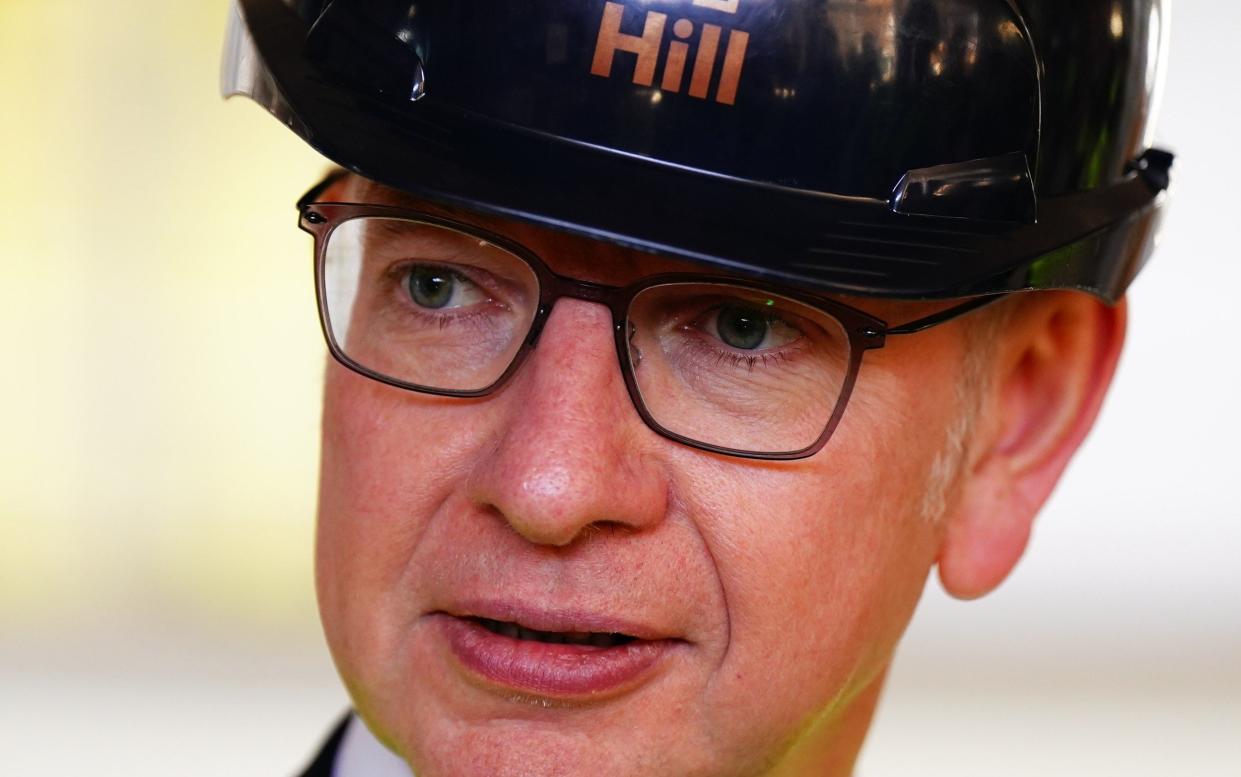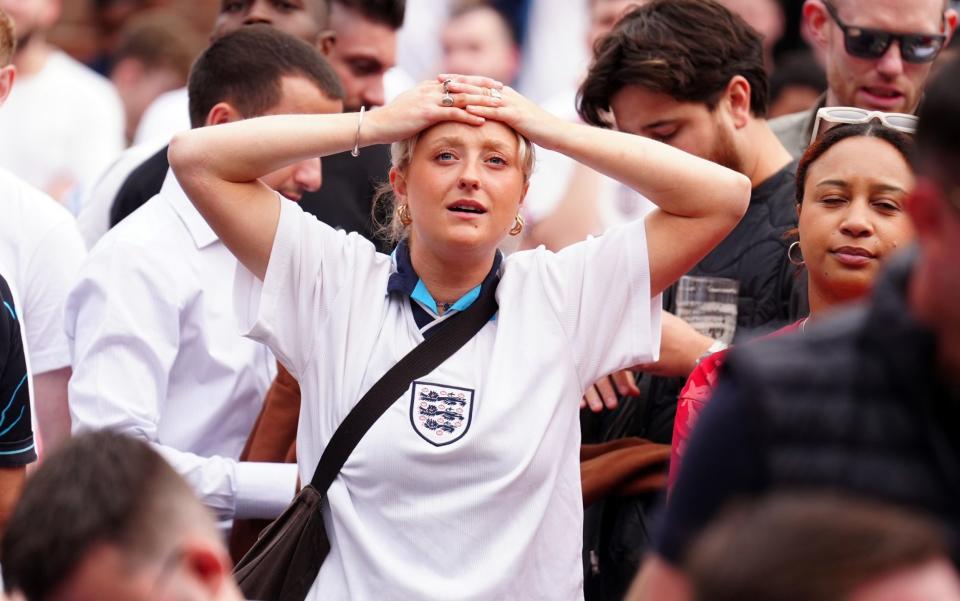Letters: Michael Gove is wrong about why voters lost faith in the Conservatives

- Oops!Something went wrong.Please try again later.
SIR – Michael Gove has suggested that Liz Truss is to blame for the Conservative Party’s dire election prospects (report, June 21).
Presumably he feels that voters are not concerned by: partygate; strikes; sky-high rental prices; an abysmal Brexit deal; years of Tory infighting; frozen income tax bands; NHS waiting lists; the surge in illegal immigration; increased capital gains tax; windfall taxes discouraging investment; patronising policies such as the sugar tax; or the country being held hostage by Left-wing protest groups.
Or how about the failure to invest in new energy resources, pushing up utility bills; the failure to reform IR35; the failure to increase our prison capacity; or the expensive Rwanda scheme failing to get off the ground?
Are we really to believe that voters are more upset by Liz Truss’s 49 days in office almost two years ago than they are by the Tories’ record of failure over many?
Richard Smith
Reading, Berkshire
SIR – As a lifelong Conservative voter, I watch with horror as the latest betting scandal unfolds (report, June 21) and wonder if the party will ever run out of nails to drive into the lid of its own coffin.
Douglas Coleman
Bowdon, Cheshire
SIR – There is something missing in this election: a straw of hope for us to grasp. Instead we get platitudes, unlikely promises, fearmongering, massaged data and soap-box rants.
Who will make us believe that they have the vision, ability and honesty to lead this country to a better future?
I cannot see this person. For many of us, the only realistic choice is between the Conservatives and Labour, yet both seem equally unpalatable.
The last prime minister with charisma was Boris Johnson, but his character flaws let him down.
What we need is a leader with the spark to excite our thoughts, the nous to create the right team and the ability to transform promises into results.
I fear we will be disappointed.
David Platts
Newark, Nottinghamshire
Labour and badgers
SIR – Your correspondents (Letters, June 19) have criticised the Labour Party’s manifesto commitment to end the badger cull.
Although highly controversial, this cull was successful in reducing the incidence of tuberculosis in cattle. But now, at last, we have the option of vaccinating badgers against TB and, with a reduced population, a real chance to achieve herd immunity.
On my small farm in Wiltshire, highly professional staff from the Animal and Plant Health Agency have recently visited us several times, trapped and vaccinated four badgers and returned them to the wild.
The programme is new, but vaccination is surely the future.
Andrew Sells
Chair, Natural England, 2014-19
Sopworth, Wiltshire
HMRC howlers
SIR – Complaints to HMRC rose by two thirds last year and customer service has fallen to its worst ever level (“Thousands of taxpayers get compensation for HMRC delays”, report, June 21). Is it reasonable, then, to wonder why HMRC’s chief executive was awarded a knighthood last week?
How will the public sector deliver better value for taxpayers unless there are consequences for failure?
James Little
Epsom, Surrey
Teacher ‘boost’
SIR – Labour wishes to “recruit an additional 6,500 new expert teachers”, paid for by levying VAT on private school fees (report, June 18).
For context, in 2023 there were 468,693 full-time-equivalent teachers working in 29,616 state schools in the UK, according to the Department for Education.
So, Labour wishes to put in jeopardy the education of thousands of private school pupils in order to increase the number of teachers by 1.39 per cent, adding 0.22 teachers per school.
Andrew Gardiner
Wantage, Oxfordshire
SIR – My school has educated the choristers of Wells Cathedral for over 1,000 years, and contributes profoundly to the spiritual, cultural and civic life of our region.
It is also, among other things, one of England’s four music specialist schools, training talented young musicians, regardless of their financial circumstances, for the benefit of the nation. Imposing VAT on independent school fees could put all this, and more, in jeopardy.
Eighteen months ago I had the pleasure of showing a member of Labour’s shadow Cabinet around my school. I spoke to her about the concerns my pupils’ parents and I have regarding Labour’s school fees policy.
I was told that we needed to engage with the party prior to a general election. Despite my best efforts, reaching out on numerous occasions to a number of individuals, Labour has not reciprocated my engagement.
It seems that the VAT policy has become so totemic that it is blinding politicians not only to the unintended consequences of the proposal but also the known ones.
My colleagues and I wholeheartedly agree with Labour’s desire to improve the educational provision for every child in this country, and we stand ready to work with them to find creative ways of achieving this. But we need the party to engage with us.
Alastair Tighe
Head Master, Wells Cathedral School
Wells, Somerset
Parking blues
SIR – I am a holder of a Blue Badge (Letters, June 21).
You cannot assume that any disabled space in a car park is free. It is very confusing as every local authority sets different rules for off-street parking. Some allow free parking, some give an extra hour and some charge the full price.
The only definite free parking for Blue Badge holders is on-street parking, which is guaranteed nationally.
It would be helpful if local authorities followed the same rules across the country.
Lyn Phillips
Teignmouth, Devon
Lucette’s journey
SIR – It was horrifying to read about the sinking of the Robertson family’s schooner, Lucette, in 1972 (“I survived on turtle blood for 38 days in the Pacific Ocean after killer whales sank our boat”, Features, June 18). The story holds a deep meaning for my own family, too.
We spent three years enjoying many happy times on Lucette, when my father’s regiment was stationed in Malta, the boat’s then home.
My father, then Major “Dickie” Bird (the future Soldier magazine cartoonist), used her regularly to take groups of volunteer soldiers on sail-training exercises to Sicily. He spent hours working on her: painting, fiddling with the engine, repairing her sails and scrounging bits to add to her. In 1968 we sailed her for a week on a family trip to Syracuse, along with another military family.
After we left Malta, Lucette continued to be enjoyed by other families there, until Dougal Robertson brought her to the UK, and set off on his round-the-world attempt. By then the state of her hull was deteriorating. Perhaps it would have been safer to keep Lucette in the Mediterranean, where she was happiest.
Leslie Glegg
Garstang, Lancashire
Drinks with a star
SIR – I was immensely saddened to learn of the death of Donald Sutherland (Obituaries, June 21). I lived in Montreal for eight years in my twenties and by accident we became close friends.
We met almost like clockwork in the basement bar of the Ritz-Carlton hotel on a Friday evening once a month, and would put the world to rights.
He was unequivocally the most charming, entertaining and, above all, kindest human being I have ever had the privilege to meet.
Justin Tahany
Reading, Berkshire
Brahms for the soul
SIR – Music from French films (Letters, June 21) can conjure a very potent memory for me.
My beloved husband and I met during our schooldays in Oxford, when we were both members of a youth orchestra. We married in 1958, when he was in his last year reading chemistry at New College, Oxford, and I was working in a laboratory in the Radcliffe Infirmary. We went to see Les amants at the cinema and were moved by both the film and its music, which was the second movement of Brahms’ second string sextet.
That music became a part of our lives: we were thrilled when our eldest son, Roger – who sadly died two years ago – recorded it with the Raphael Ensemble in 1988, and we played it at my husband’s funeral.
I hope it will be played at mine.
Rosalind Tapping
Basingstoke, Hampshire
PoWs in Kent
SIR – My family’s farm in the Darent Valley, west Kent, took on a German PoW (Letters, June 19) from the nearby camp during the war.
My grandfather clearly treated Georg well, and when the war ended he stayed on. He married a German nurse and they made Kent their home, living in one of our cottages until my father sold up in 1969.
Georg became something of a family friend as well as an employee, and as a child I knew of no stigma attached to his presence with us.
A poignant feature of the couple’s life here, however, was that the post-war sub-division of Germany made joint visits to see their families impossible, as one was in the west and the other in the east.
David Lander
Old Woking, Surrey
SIR – After the war German PoWs came to our farm in Kent to help with the harvest.
I remember a lorry arriving full of uniformed men. They helped with lifting potatoes. My father was shocked when they ate raw potatoes from the ground because they were so hungry.
I was five at the time, and my mother was criticised for allowing my elder sister and me to talk to them. But she pointed out that they all had families in Germany that they were anxious about, and were kind men.
One, Otto, carved me a wooden tortoise, which sadly I no longer have.
Mary Kellett
Worcester
Gareth Southgate can’t keep playing it safe

SIR – Another England football performance, another dud (“Southgate in Shearer firing line”, Sport, June 21). Yes, we are currently top of our group in the Euros, but we were also lucky to get a draw with Denmark.
We began well against a good Danish side – then went into our shell as soon as we scored.
I was reminded of the 2018 World Cup semi-final against Croatia, in which we scored first then succumbed later in the game. In the 2020 Euros final against Italy, we scored within two minutes, then tried to defend the lead for 80-odd minutes – without success. Players have come and gone, but Gareth Southgate’s negative tactics have been a constant.
I believe that, over the past six years, England have had one of the most talented squads in the world, but will not win anything with this manager. You have to be brave to win – and Southgate isn’t.
Jim Sokol
Minehead, Somerset
SIR – Like Charles James (Letters, June 21) I endured a 1950s education that placed sport above academic pursuits.
The PE teacher enjoyed mocking and humiliating any boy who was not interested in football. Standing in the freezing drizzle of a winter’s afternoon in Sheffield, dreading the approach of a wet, mud-covered leather ball, left a deep impression on me and resulted in a lifelong loathing of sport – in particular, football.
Chris Harland
Hull, East Yorkshire
Letters to the Editor
We accept letters by email and post. Please include name, address, work and home telephone numbers.
ADDRESS: 111 Buckingham Palace Road, London, SW1W 0DT
EMAIL: dtletters@telegraph.co.uk
FOLLOW: Telegraph Letters @LettersDesk
NEWSLETTER: sign up to receive Letters to the Editor here

